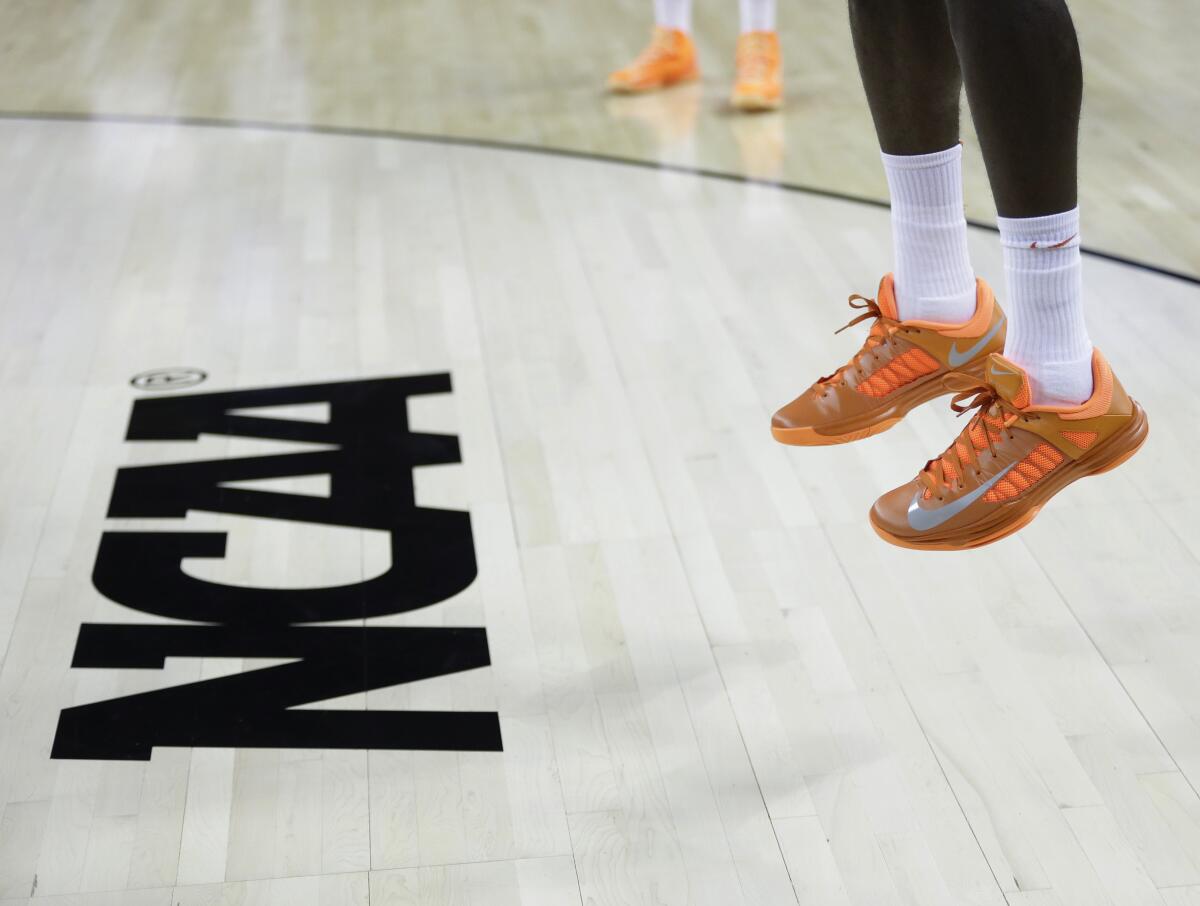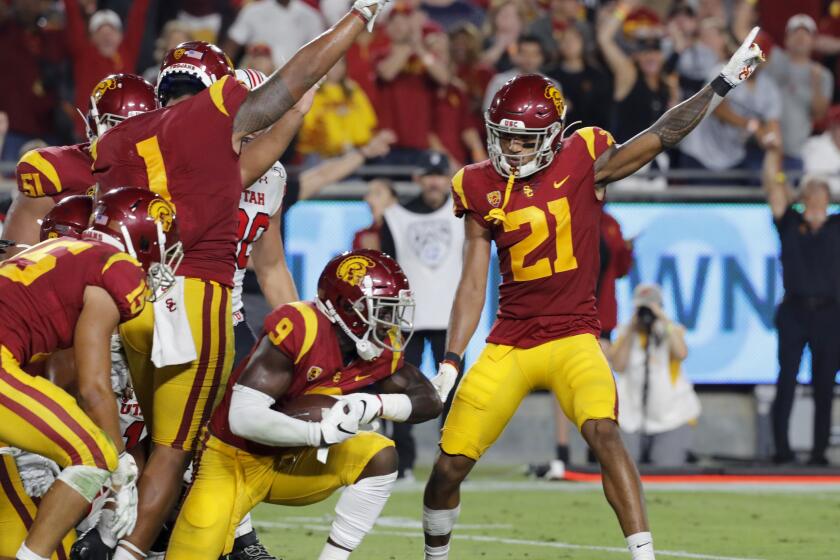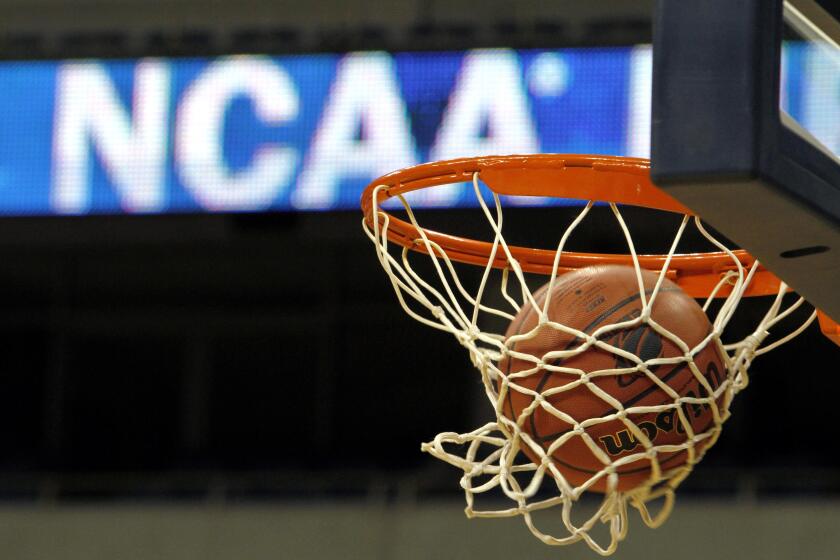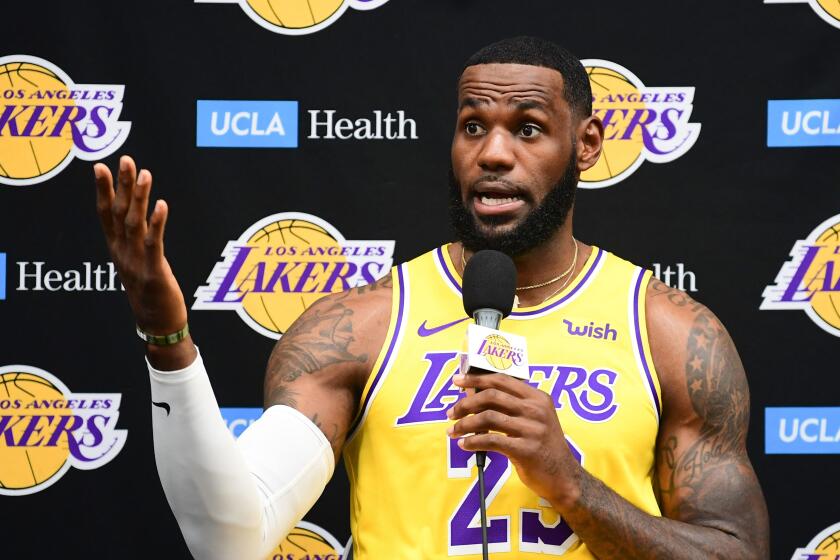California’s college sports reform bill exposes hypocrisy of NCAA’s money grab

- Share via
It was the very inscription of inequity.
Last spring, then-USC athletic director Lynn Swann was spotted in Virginia at a memorabilia show signing his autograph for at least $200 per scribble. At the same time, in the sweaty trenches at its practice field in downtown Los Angeles, the USC football team was holding spring workouts with players for whom a sold signature would have resulted in immediate suspension.
Swann, who was already being paid millions for essentially running a football program, was allowed to profit off his name while the unpaid players actually toiling in that program could not.
A different autograph has dramatically changed that unfair equation.
On Monday,Gov. Gavin Newsom signed into law SB 206, formerly known as the “Fair Pay to Play” act, a measure that revs up the bulldozer that could finally level the playing field in America’s most unjust athletic system. Beginning in 2023, in direct violation of the rules of the cartel known as the National College Athletic Association, athletes in California colleges will be allowed to receive endorsement deals.
Gov. Gavin Newsom has signed a high-profile bill that would allow college athletes to earn money, despite NCAA objections.
The USC quarterback can promote his favorite video game. The UCLA soccer player can be paid to coach at her high school’s summer camp. The entire Stanford volleyball team can make money appearing in an advertisement for Facebook.
The legislation does not require the colleges to pay the athletes. That idea is filled with too many complications — which ones do you pay, and how much? — and will probably never happen.
This is the next best thing: athletes finally able to pay themselves, to use their talents for personal gain, the same talents that have long been exploited by colleges in the name of a scholarship that doesn’t begin to cover the value provided by today’s top stars.
The inequity at USC is mirrored at UCLA, where football coach Chip Kelly is being paid $23.3 million over five years to field a football team that is watched by almost nobody, attracting historically small crowds to the Rose Bowl.
Meanwhile, in January, Bruins gymnast Katelyn Ohashi performed a stirring gymnastics routine in a video that went viral with more than 44 million views, yet rules prevented her from making a penny from it.
The California law finally ensures that, in a student-athlete business earning billions annually, the student-athlete becomes part of the business. Other states are discussing adopting similar measures. Here’s hoping they do, finally forcing the NCAA to make drastic changes in the draconian way it does business.
What will the NCAA do in response to the first state challenging its rules on amateurism, which limit athlete compensation to the full cost of being a student?
Granted, much could happen between now and 2023. There could be court appeals and NCAA rules adjustments. There is no way of predicting how this will all look in three years. But no matter what eventually happens, something concrete has finally happened, something big and bold and transformative.
“This is a big step toward equal rights for college athletes,” said former UCLA linebacker Ramogi Huma, a leading advocate of college athletics reform as the executive director of the nonprofit National College Players Assn. “They can now have the same kind of freedom that other students on campus have. They can use their talents anyway they want.”
Kelly, UCLA’s football coach, supports the bill, telling reporters Monday it was, “the right thing to do … it doesn’t cost the universities, it doesn’t cost the NCAA.”
However, the NCAA doesn’t agree and is fighting this. The local schools are all fighting this. They won’t have to pay the players, but this measure would cut into their revenue from sponsors. Everyone wants to protect not only their piece of the pie, but the entire pie.
Remember three years ago when UCLA signed a $280-million endorsement deal with Under Armour that was the most lucrative shoe and apparel sponsorship in college sports history? Every school’s biggest fear is that their next big sponsor decides to give some of that money to, oh, the athletes who actually earn it.
Lakers star LeBron James believes California’s NCAA reform bill, which was signed by Gov. Gavin Newsom on Monday, will bring “historical change in time.”
“Would that Under Armour deal be worth $280 million if they could have given some of that to Josh Rosen instead?” said Huma, referring to the celebrated former Bruins’ quarterback. “The schools have been able to monetize every commercial dollar from every college athlete until now, and they want to keep it that way.”
The NCAA initially responded to the legislation with a completely toothless threat to ban the 58 California schools from participating in NCAA competitions. Yeah, right, like it would willingly lock its cash registers to the teams in the nation’s second-biggest media market.
That threat was a joke, as was the NCAA’s response Monday noting its increased worry that other states would follow in California’s bold footsteps.
“It is clear that a patchwork of different laws from different states will make unattainable the goal of providing a fair and level playing field for 1,100 campuses and nearly half a million student-athletes nationwide,” read the NCAA statement.
Do they really expect us to believe that it’s a fair and level playing field now? Schools from the five biggest conferences already attract nearly all of the best high school stars because those schools are able to spend millions on the brightest coaches and best facilities.
High school freshmen and sophomores could have new opportunities to market themselves under the new legislation signed by Gov. Gavin Newsom.
So SB 206 would suddenly render the football competition between Alabama and San Jose State as unequal? You mean the North Carolina and St. Mary’s basketball are no longer on a level gym floor?
The NCAA runs the most inherently unequal sporting endeavor in this country. The rich get richer, the football champion usually comes from the South, and in men’s basketball Cinderella rarely makes it past the Sweet 16.
To say that schools in places like Southern California would have a distinct recruiting edge because of the endorsement opportunities in a larger marketplace ignores the reality that the quarterback in Lincoln, Neb., or the shooting guard in Lawrence, Kan., are just as valuable in those environments as is a USC running back in a crowded sports space like Los Angeles.
“There is no level playing field even with current NCAA rules. There are certain programs that already have a big advantage,” Huma said. “To draw a line in the sand about level playing fields is a stance that has already been refuted by the courts.”
My favorite response Monday was from the Pac-12 conference that noted its disappointment in a statement that claimed, “it will have very significant negative consequences for our student athletes and broader universities in California.”
Translated, any sharing of revenue can’t be good for Pac-12 Commissioner Larry Scott, who makes $5.3 million annually for running a conference fueled by unsalaried labor.
“I was encouraged to see our legislators stand up to NCAA bullying,” Huma said.
Thanks to some thoughtful and tough California lawmakers, maybe the bullying will stop, not just in California, but everywhere. Maybe those billions worth of collegiate sporting events will finally put some money in the pockets of those who are actually playing them.
More to Read
Go beyond the scoreboard
Get the latest on L.A.'s teams in the daily Sports Report newsletter.
You may occasionally receive promotional content from the Los Angeles Times.














